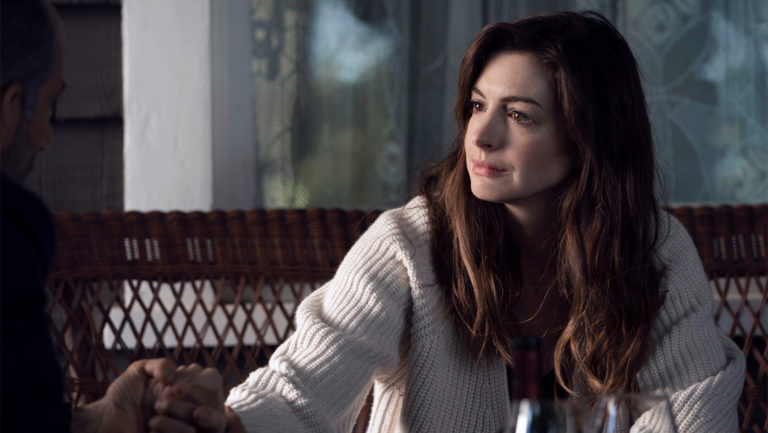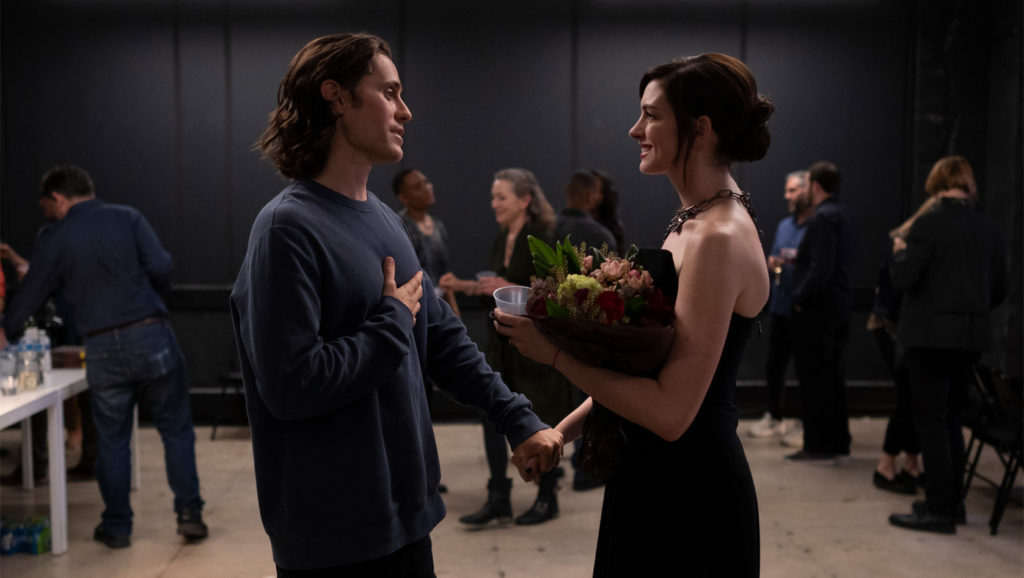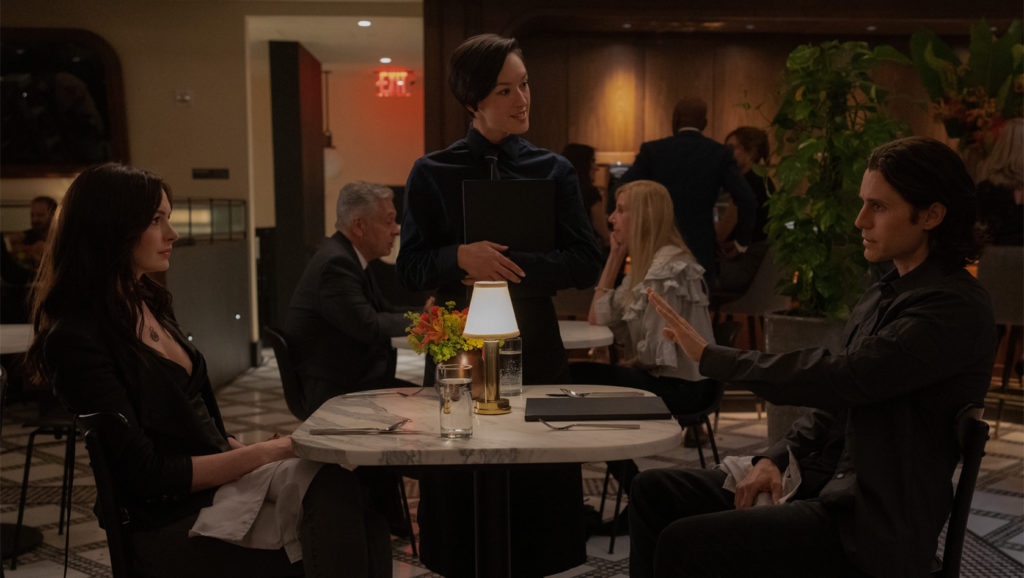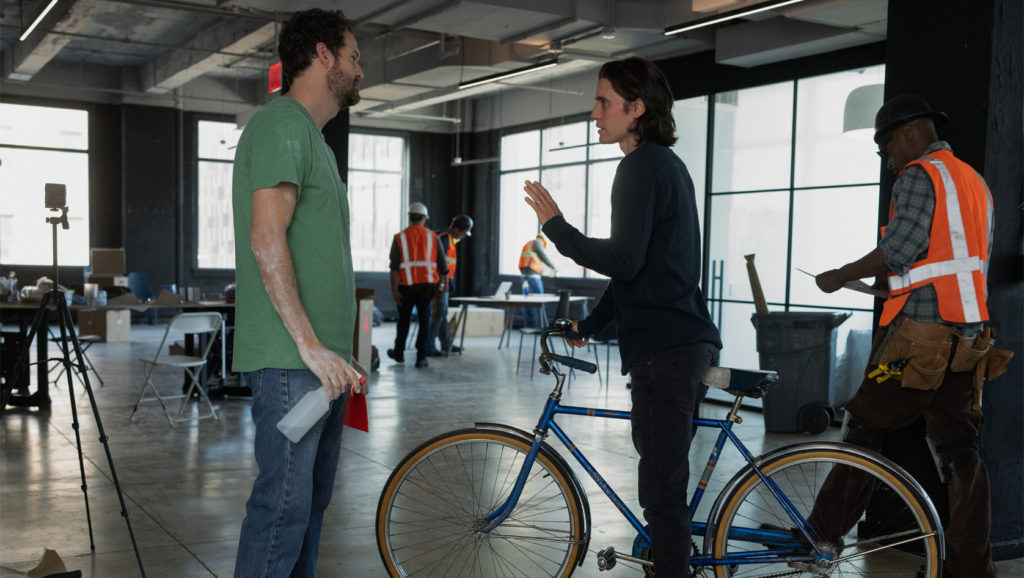
Oscar-winning actress Anne Hathaway says she felt a keen responsibility playing Rebekah Neumann, a contemporary real-life actress and entrepreneur, in the Apple TV+ limited series, WeCrashed.
The eight-part, fact-based dramedy is based on a podcast that followed the rise and fall of WeWork, Rebekah’s husband Adam’s wildly successful office-sharing startup company.
Co-starring Jared Leto, Kyle Marvin, America Ferrera, Anthony Edwards and O.T. Fagbenle, the television version of WeCrashed debuts on the streaming service Friday after it premiered last week at the SXSW Festival.
Hathaway recently sat down with CinemaDaily US for an exclusive Zoom interview.

Q: How did you find your way into Rebekah’s mind and heart?
AH: When I read the pilot, I thought it was a very interesting story. I knew nothing about WeWork, nothing about Adam Neumann, nothing about Rebekah Neumann, so I did the first thing that anyone would do — I Googled them. And I read the media take on Rebekah and then I realized I knew some people that knew her, so I called them.
I was expecting them to corroborate what I read about them in the media narrative and what they told me was totally different. The person that they described was really sweet and earnest and really wanted to make the world a better place and then I just went back and reread the pilot and thought there is something really interesting here about a very relatable, human story about someone who has a goal, a really ambitious goal and can’t see the way that they are perhaps falling short of that goal, while still speaking very loudly about it. …
The more I learned about her, the more I fell for her and I just had such a compassionate take on her because very rarely in life are people conveniently villainous, despite what we read about them. Very often, there is a lot more nuance than that and certainly her story contained that interpretation.
Q: Do you think the show’s theme of disruption will resonate with viewers whose own workplaces may have drastically changed in recent years?
AH: That’s genuinely above my pay grade. [Laughs.] I don’t know what people are going to connect to. I can’t really think about that. I always just have to focus on my character and in this case the joy of getting to be one-half of a partnership with an actor as fine as Jared Leto.
Q: Did you talk with Jared about your characters and where they were coming from?
AH: Never! We never talked about it. It was surprising. It was unlike any experience I have ever had. He showed up on his first day of filming — I had been filming for a couple of days — and we sparked and it was just there. There was just something going on between us.
We never worked very consciously on crafting something. We just trusted what was there and the joy of it was just being really focused and wild together at the same time. There wasn’t a lot of chitchat between takes. There weren’t any strategic chemistry meetings or anything like that. He did his work in kind of his private laboratory and I did the same and then we came together and had discovered we made something together that complemented each other and there was a real thrill and a joy to that.

Q: We see in the series that Adam and Rebekah are the creative, dreamer people while their business partner Miguel is more practical and strategic. Do you think that for any endeavor to really succeed a team needs a Miguel-type personality to be involved?
AH: I don’t know. I’m not sure. I think it is specific to every partnership and it depends on what the goals are. I certainly know, in my life, I’ve been very lucky to be the beneficiary of people who have been able to practically execute things that I’ve wanted to do and have been able to support my dreams in really concrete ways. So, from my experience, I would say, yes, absolutely, but it’s hard to comment on other people.
Q: Can you talk a little about Rebekah’s relationship with her father? He seems so supportive of her. Do you think that shaped her and taught her to expect great things out of life?
AH: I’m always so conscious of the fact that I played a real person and that Rebekah’s story is really HER story and this is just my interpretation of it and I am part of a group’s interpretation of it, so I weirdly don’t feel right commenting on such things because I think it is for her to tell us. Anything that I have to say about it or desire to say is on the screen.
Q: Has Rebekah reached out to you? Do you want her to?
AH: Again, I feel like that sort of stuff takes away from [the experience.]

Q: What does serving as a producer on projects like this allow you to do?
AH: It wasn’t very different than what I do as an actor and it’s made me realize that maybe I — I don’t want to use the word “overstep” as an actor — but maybe level of collaboration I seek is unusual. But I was so lucky to have the partnership that I did on this one with Lee Eisenberg and Drew Crevello, our showrunners and series creators.
They really invited me and made me feel like such a valued member of the team and were always open to hearing my thoughts on who Rebekah was and how she would see things in the world around her and they supported me at every turn in terms of making sure that her world reflect was accurate because she is someone who is incredibly detail-oriented, almost more so than any other character that I’ve played. So much of the character would be communicated through those details. I can’t say I was pushing harder for that because I was a producer. I don’t really know yet. I’m still figuring it out. It was new.
Q: This is based on a podcast. Do you listen to podcasts and do you think this is an interesting medium to mine for material for dramatic TV series and films?
AH: Wherever you can mine great stories, mine them. I don’t know that a podcast is better than anything else but it has yielded some pretty cool results. I happen to be lucky enough to be a part of one. I don’t listen to many podcasts, but the one I keep going back to is Oprah’s Super Soul Sunday. When I was making The Witches I had sometimes up to five hours in the chair doing prosthetics and we would put Oprah on and I would do my best not to cry because it would ruin the latex.
Q: Speaking of crying, you have such a heartbreaking scene in WeCrashed where Rebekah decides to give up acting. What was it like showing this confident, vibrant woman as so vulnerable?
AH: It’s really hard. It’s really humbling to realize that perhaps something that you really want to be good at is not available to you, something that you really desire. It’s heartbreaking and it’s something that I’ve experienced in my life, so I wanted to treat that moment with real tenderness because it is soul-crushing to realize that a dream is not going to come true.
Q: What kind of roles are you looking to follow this up with, especially after coming out of the coronavirus pandemic?
AH: I want stories that make me believe in impossible things. I want lovely, imaginative, passionate stories that make me suspend disbelief. I think we’ve all been in our own little practical Zoom bubble for two years and I think we all want to travel in any way we can.

